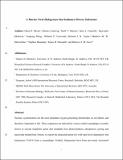A marine viral halogenase that iodinates diverse substrates
Abstract
Oceanic cyanobacteria are the most abundant oxygen-generating phototrophs on our planet and are therefore important to life. These organisms are infected by viruses called cyanophages, which have recently shown to encode metabolic genes that modulate host photosynthesis, phosphorus cycling and nucleotide metabolism. Herein we report the characterization of a wild-type flavin-dependent viral halogenase (VirX1) from a cyanophage. Notably, halogenases have been previously associated with secondary metabolism, tailoring natural products. Exploration of this viral halogenase reveals it capable of regioselective halogenation of a diverse range of substrates with a preference for forming aryl iodide species; this has potential implications for the metabolism of the infected host. Until recently, a flavin-dependent halogenase that is capable of iodination in vitro had not been reported. VirX1 is interesting from a biocatalytic perspective as it shows strikingly broad substrate flexibility and a clear preference for iodination, as illustrated by kinetic analysis. These factors together render it an attractive tool for synthesis.
Citation
Gkotsi , D S , Ludewig , H , Sharma , S V , Connolly , J A , Dhaliwal , J , Wang , Y , Unsworth , W P , Taylor , R J K , McLachlan , M M W , Shanahan , S , Naismith , J H & Goss , R J M 2019 , ' A marine viral halogenase that iodinates diverse substrates ' , Nature Chemistry , vol. 11 , no. 12 , pp. 1091–1097 . https://doi.org/10.1038/s41557-019-0349-z
Publication
Nature Chemistry
Status
Peer reviewed
ISSN
1755-4349Type
Journal article
Description
We thank the European Research Council under the European Union’s Seventh Framework Programme (FP7/2007–2013/ERC grant agreement no. 614779 GenoChemetics to R.J.M.G.), Syngenta and Wellcome ISSF (grant no. 204821/Z/16/Z to D.S.G.) for generous financial support.Collections
Items in the St Andrews Research Repository are protected by copyright, with all rights reserved, unless otherwise indicated.

